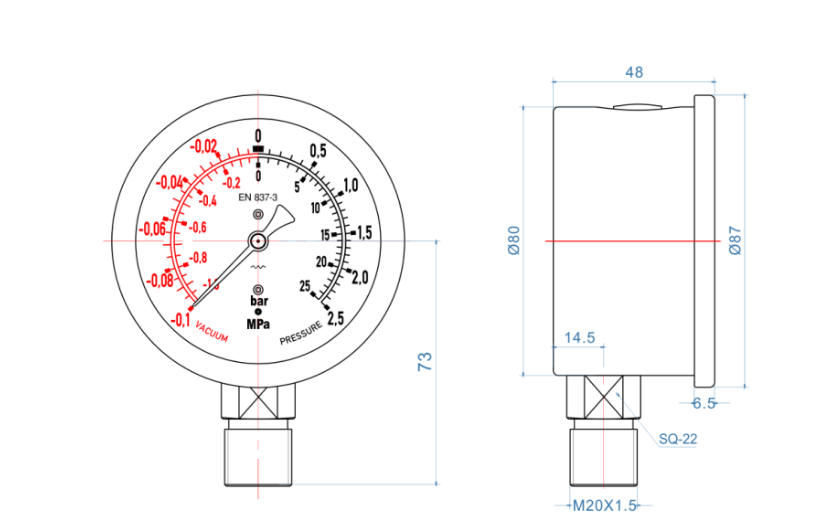
Dec . 05, 2024 17:38 Back to list
Key Applications of Differential Pressure Gauges in Pharmaceutical Industry Operations
The Importance of Differential Pressure Gauges in the Pharmaceutical Industry
In the pharmaceutical industry, maintaining a pristine environment is crucial to ensuring product quality and safety. Among the various instruments employed to monitor and maintain these environments, differential pressure gauges hold a significant position. These instruments are vital for several applications, including cleanrooms, sterile production areas, and ventilation systems. Their ability to measure the difference in pressure between two points ensures that the desired conditions for pharmaceutical manufacturing and research are consistently met.
Understanding Differential Pressure Gauges
A differential pressure gauge measures the difference in pressure between two points in a system. In the pharmaceutical context, these two points could be the interior and exterior of a cleanroom, or between adjacent areas with different pressure levels. By providing real-time data on pressure differentials, these gauges help to ascertain whether particulate contamination, allergens, or other contaminants are kept at bay, which is critical in environments where even minor deviations can lead to significant product defects or health hazards.
Applications in Pharmaceutical Operations
1. Cleanroom Monitoring Cleanrooms are specially designed environments where the air cleanliness is controlled to prevent contamination. Differential pressure gauges are installed at entry points to monitor the pressure differentials between the cleanroom and adjacent areas. Maintaining a higher pressure inside the cleanroom compared to the outside prevents unfiltered air from entering the controlled space.
2. Sterilization Processes In processes such as autoclaving, which is used to sterilize equipment and materials, differential pressure measurements are crucial. They help to ensure that the sterilization chamber maintains the correct pressure compared to the surrounding areas throughout the cycle, enhancing the efficacy of the sterilization process.
3. HVAC Systems Heating, ventilation, and air conditioning (HVAC) systems in pharmaceutical facilities must operate at optimal levels to maintain the necessary temperature and humidity for sensitive products. Differential pressure gauges are employed in these systems to monitor the performance of filters and ducts, ensuring that airflow remains consistent and efficient, thus preventing contamination and product spoilage.
differential pressure gauge in pharma industry service

4. Biotechnology Processes In biopharmaceutical production, differential pressure gauges are used in bioreactors to monitor processes such as fermentation or cell culture. The gauges help ensure that proper input and exhaust pressures are maintained, which is essential for optimal growth conditions and product yields.
Regulatory Compliance and Quality Assurance
The pharmaceutical industry is one of the most regulated sectors, with strict standards set by organizations such as the Food and Drug Administration (FDA) and the European Medicines Agency (EMA). Differential pressure gauges contribute to regulatory compliance by providing critical data that can be documented and analyzed during audits or inspections. Keeping accurate records of pressure differentials helps to demonstrate that facilities consistently operate within safety and quality standards.
Choosing the Right Differential Pressure Gauge
When selecting a differential pressure gauge for pharmaceutical applications, several factors should be considered
- Accuracy High accuracy is essential to ensure that pressure readings reliably reflect actual conditions. - Range The gauge should be able to measure the expected pressure differentials within the specific application. - Material Compatibility Given the sterile environment, materials used in gauges must be resistant to contaminants and easy to clean. - Calibration Regular calibration is necessary to maintain measurement accuracy.
Conclusion
In summary, differential pressure gauges are indispensable tools in the pharmaceutical industry, essential for maintaining the controlled conditions required for product safety and efficacy. Their role in cleanroom monitoring, sterilization processes, HVAC systems, and biotechnological applications showcases their versatility and necessity. As the pharmaceutical landscape continues to evolve, the importance of precise monitoring and compliance will only increase, making differential pressure gauges more critical than ever to safeguarding public health.
-
High-Precision 5 Valve Manifold Differential Pressure Gauge Suppliers
NewsApr.29,2025
-
High-Precision Diaphragm Vacuum Pressure Gauges Manufacturers & Quotes
NewsApr.29,2025
-
Omega Differential Pressure Gauges High Accuracy & Durability
NewsApr.28,2025
-
Low Pressure Differential Pressure Gauges Precision Solutions & Quotes
NewsApr.28,2025
-
Digital Diaphragm Pressure Gaauge Precision Measurement & OEM Quotes
NewsApr.28,2025
-
Differential Pressure Gauge China Price High-Accuracy & Best Quotes
NewsApr.28,2025
